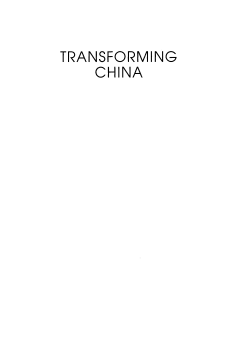
Additional Information
Book Details
Abstract
These essays both enhance an understanding of China's immense success in meeting these challenges in the past and provide an indication of the challenges that still lie ahead. China's system reforms have been described as 'groping for stones to cross the river'. The journey across the river is far from over, and the other bank is only dimly visible.
At the end of the 1970s, China was a poor country with a huge population, ruled by the Chinese Communist Party. The domestic economy was organized through direct administrative instructions and was isolated from the international economy. After a quarter of a century, China has been transformed beyond imagination. In the course of this transformation, China's policymakers have faced enormous challenges.
The essays in this book address different aspects of those challenges. The 'development' challenge involved devising policies that would raise the mass of the Chinese people out of poverty and avoid the disasters that had, in the worst cases, caused millions of deaths through famine. The 'transition' challenge involved, firstly, resolving the relationship between changes in the economic and political systems; and secondly, finding the correct sequence and nature of reforms necessary to improve economic performance. The 'globalization' challenge involved identifying the best way in which to integrate China’s economic system with the international economy at a time of revolutionary change in the global business system. These essays seek both to enhance understanding of China's immense success in meeting these challenges in the past and to provide an indication of the challenges that still lie ahead. China's system reforms have been described as 'groping for stones to cross the river'. The journey across the river is far from over, and the other bank is only dimly visible.
Peter Nolan is Sinyi Professor of Chinese Management at the Judge Institute of Management, Cambridge University, and Fellow of Jesus College, Cambridge University.
Table of Contents
| Section Title | Page | Action | Price |
|---|---|---|---|
| Front Matter\r | 1 | ||
| Half Title\r | 1 | ||
| Series Page\r | 2 | ||
| Title\r | 3 | ||
| Copyright\r | 4 | ||
| Dedication\r | 5 | ||
| Also by Peter Nolan\r | 6 | ||
| Contents\r | 7 | ||
| Acknowledgements\r | 8 | ||
| Main Body\r | 9 | ||
| Introduction: China at the Crossroads\r | 9 | ||
| Notes\r | 14 | ||
| References\r | 14 | ||
| 1. Starting Point of Liberalization: China and the Former Ussr on the Eve of Reform\r | 15 | ||
| Notes\r | 48 | ||
| References\r | 49 | ||
| 2. China's New Development Path: Towards Capitalist Markets, Market Socialism or Bureaucratic Market Muddle?\r | 53 | ||
| Notes\r | 84 | ||
| 3. Politics, Planning, and the Transition from Stalinism: The Case of China\r | 85 | ||
| Notes\r | 108 | ||
| References\r | 109 | ||
| 4. Democratization, Human Rights and Economic Reform: The Case of China and Russia\r | 111 | ||
| Notes\r | 136 | ||
| 5. Beyond Privatization: Institutional Innovation and Growth in China's Large State-Owned Enterprises | 139 | ||
| Notes\r | 183 | ||
| References\r | 186 | ||
| 6. China, and the Global Business Revolution\r | 193 | ||
| Notes\r | 238 | ||
| References\r | 239 | ||
| 7. The Challenge of Globalization for Large Chinese Firms\r | 241 | ||
| Notes\r | 301 | ||
| References\r | 302 | ||
| 8. The Causation and Prevention of Famines: A Critique of A. K. Sen\r | 305 | ||
| Notes\r | 327 | ||
| References\r | 331 | ||
| Epilogue. Adam Smith and the Contradictions of the Free Market Economy: A Note\r | 333 | ||
| Notes\r | 340 | ||
| References\r | 341 |
